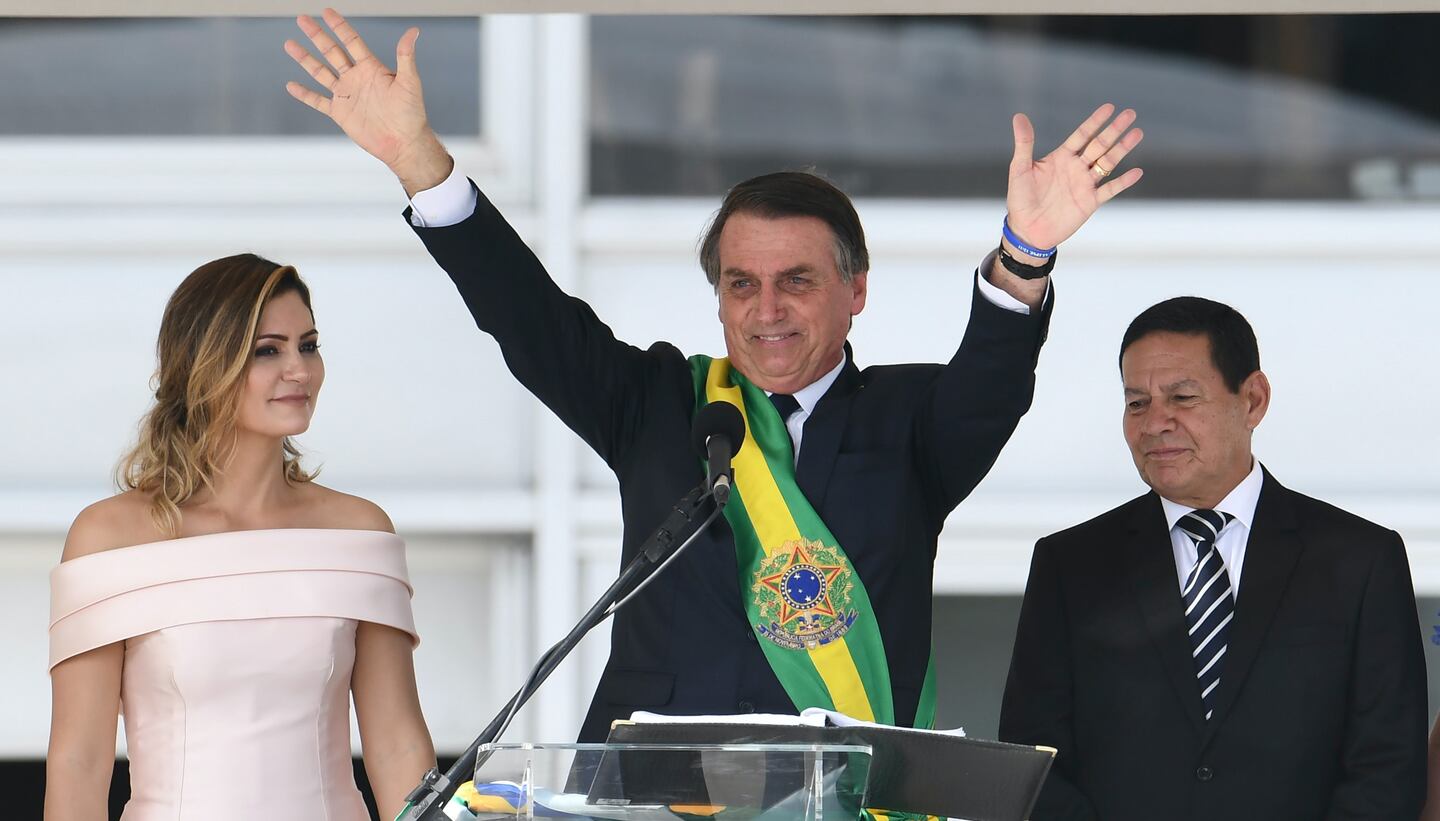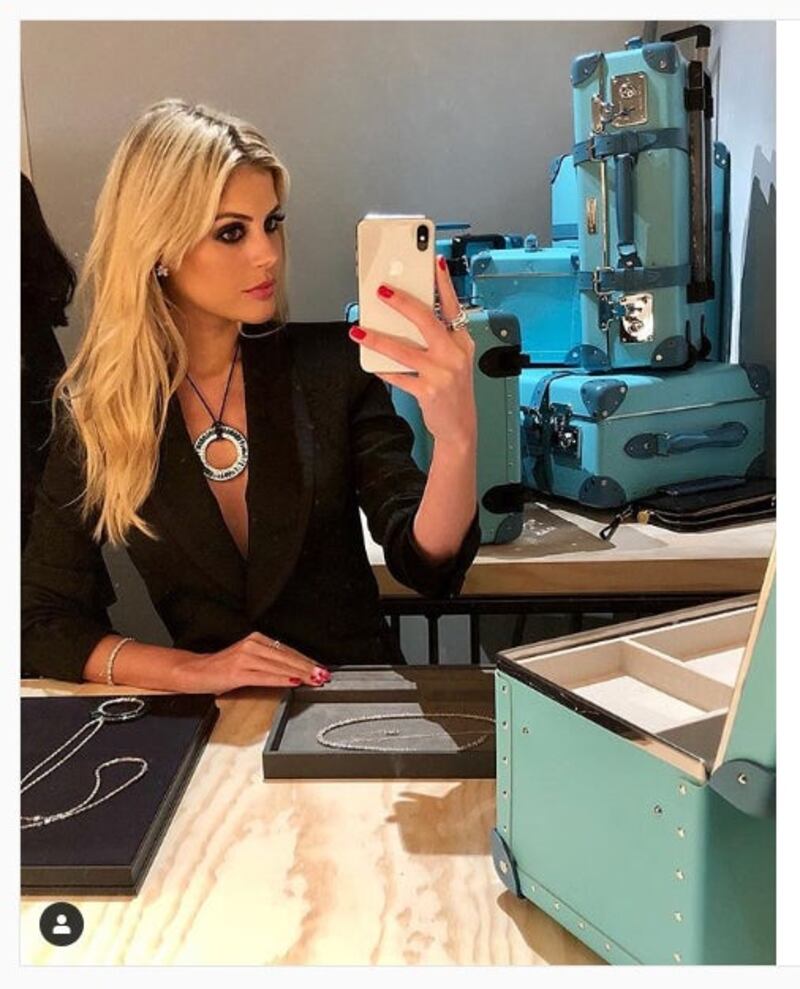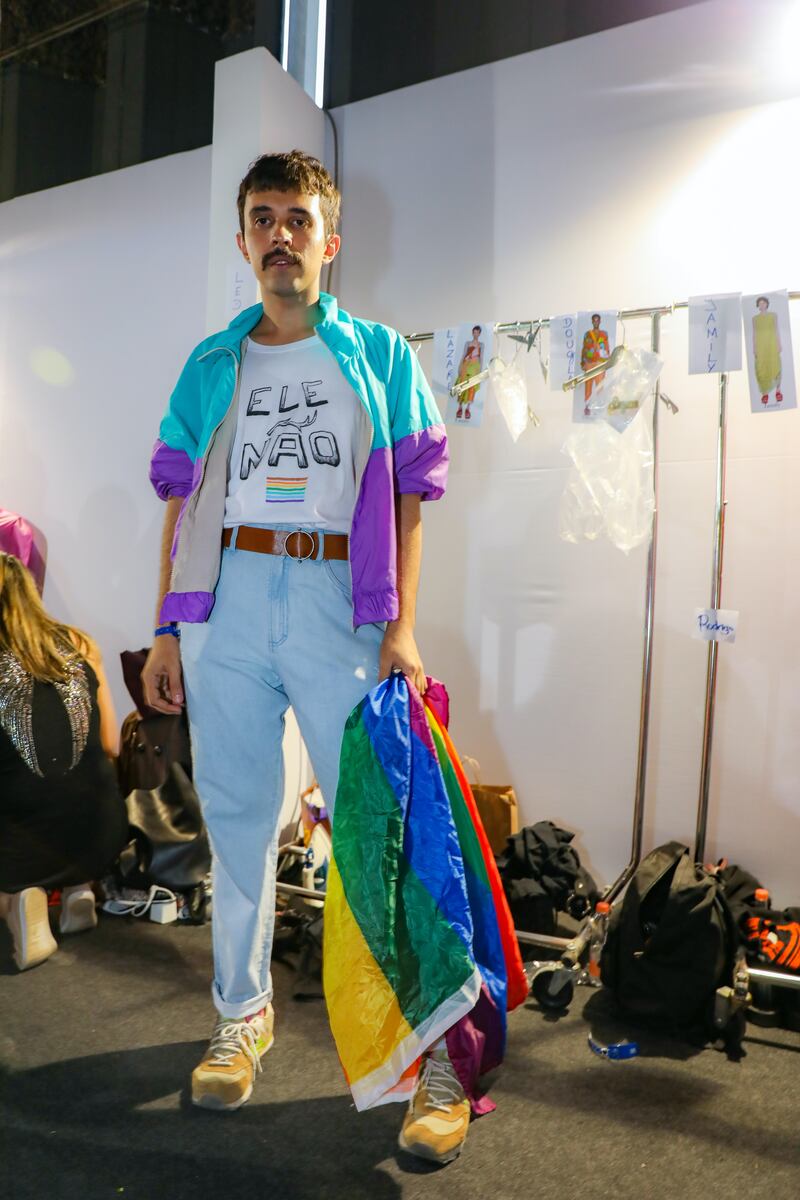
The Business of Fashion
Agenda-setting intelligence, analysis and advice for the global fashion community.

Agenda-setting intelligence, analysis and advice for the global fashion community.

SÃO PAULO, Brazil — Just a few weeks before Brazil's October election, fashion blogger Lala Rudge took to social media to express her support for the man who would eventually win the presidency. Following her declaration came a confusing sequence of events demonstrating just how tense and complex things have become in Latin America's largest economy. Since the New Year inauguration of president Jair Bolsonaro, the episode has also helped explain why industry leaders in one of the world's most volatile luxury markets feel caught between a rock and a hard place.
Bolsonaro, a far-right populist and former paratrooper, has a history of inflammatory remarks against women, black people and the gay community, as well as a controversial stance on policies including the environmental protection of the Amazon. Critics fear that Bolsonaro, who has openly praised brutal military dictatorships and is said to be pro-torture, is a threat to human rights. Supporters, however, see the polarising new president as Brazil’s very own Trumpian saviour.
"People think that if you voted for Bolsonaro, you are homophobic, [or] you are fascist, but this is not [necessarily] true," says Taciana Veloso, co-founder and chief executive of Brazilian PR firm Index Assessoria, which counts Valentino, Saint Laurent, Cartier and Iguatemi among her clients.
Nevertheless, given Bolsonaro's reputation, it is not surprising that some of Rudge's fans felt outraged when the blonde blogger backed him. At the time, it was reported that her following declined by the thousands, but in truth, it barely made a dent in her massive 1.6 million Instagram fanbase. Likewise, rumours that Tiffany & Co quietly ended its partnership with the social media star turned out to be wrong. The jeweller's PR in Brazil quickly denied it and Rudge continued to post content about the brand.
ADVERTISEMENT

Brazilian fashion influencer Lala Rudge | Source: Instagram
"Brands [here] are very afraid of putting themselves in a polemic situation and antagonise part of their customer base," says Alice Ferraz, the Brazilian fashion publicist who opened her own influencer agency called F*hits in São Paulo managing over 320 social media influencers. "In this sense, political campaigns are a minefield," she adds.
According to Jan Dehn, head of research for the Ashmore Group, an emerging-market asset manager based in London, “many Brazilians voted for Bolsonaro not because they share his social views, which are very conservative, but because they want a strong, decisive and uncorrupt leadership after years of weak government and corruption. [This is what] pushed so many people into the margins of society [and towards crime in the first place].”
A fan of Donald Trump, Bolsonaro had earned himself the nickname “the Trump of the Tropics” early in his campaign. Political analysts say there are more than a few parallels between the populist surge that elected Trump and Bolsonaro. Both sought the support of evangelical Christians and both talked tough on crime while staking their reputations on their ability to boost business and the wider economy.
Luxury market needs a stimulus
Some Brazilian business leaders, including those in the fashion and luxury industry, contend that Bolsonaro’s promise of economic reform and a purge of left-wing politicians from the Workers’ Party who have ruled the country for nearly 20 years — and are largely blamed for driving it into its worst recession in history — is the only alternative to revive the country’s $2.1 trillion economy which just began to show signs of recovery last year.
But whatever their views on Bolsonaro, luxury industry leaders of all political stripes agree that a revival can’t come soon enough. In 2015, Mexico overtook Brazil’s top spot in the Latin American luxury market after Brazil entered its worst recession in 30 years. In 2016 and 2017, the climate was particularly challenging with the luxury goods sector contracting 14.6 percent and 8.5 percent respectively.
In 2018, growth bounced back to 7.1 percent and this year it is projected to reach 9 percent . However, assuming this recovery rate is maintained, it will still take another two years before the market gets close to its pre-crisis levels of R$28.8 billion ($7.4 billion), as research provider Euromonitor reported.
ADVERTISEMENT
Brazil’s previous governments, that of Luiz Inacio 'Lula' da Silva and his successor Dilma Rousseff, led to a ballooning fiscal deficit. Consequently, Brazil’s debt to GDP ratio has increased sharply from 61 percent of GDP in 2011 to 84 percent of GDP today, according to Dehn. To put this into context, it means Brazil’s debt levels are double that of the average emerging market.
Even for entrepreneurs like Dominique Oliver, chief executive of a fast-growing Brazilian womenswear brand called Amaro, who reportedly dropped fashion blogger Luisa Accorsi after she pledged support for Bolsonaro, the president's business-friendly stance appears to offer some hope.
"The messages sent to the population and the market, [signal] a less bureaucratic system to help business. The team that Bolsonaro has put together has a lot of experience in creating growth so everyone is hopeful that this will translate into politics that will make this happen," Oliver explains, though he declines to comment on the allegations around Accorsi.
But with the country divided like never before, Veloso doesn’t believe bringing people together will be easy, “we need empathy now,” she adds. “During the elections, some brands cancelled or postponed events or new ventures because the social life of the country was very complex.”

Brazilian fashion designer Célio Dias | Photo by Gil Bianchini
Industry leaders like Daniel Funis are far more blunt with their appraisal. “The country has stopped and split,” says the general manager for Farfetch in Latin America.
While Funis concedes that he did observe a slowdown during the election period, now that it has passed there are expectations for economic changes under the new president and “a greater desire for consumption” of fashion and luxury.
A price too high for some
ADVERTISEMENT
But several members of the local fashion industry worry that the possible economic gains of a Bolsonaro presidency will come at a high price for society. “Today we see violence against the LGBT community happening in the middle of the day and more is coming with the new government,” claims fashion designer Célio Dias, the entrepreneur behind the brand LED.
The Belo Horizonte native, who has been campaigning for LGBT rights on the runway since his debut in São Paulo Fashion Week two years ago, adds that some of his sponsors recently severed ties with him because they didn’t want to get involved as the elections were approaching. “We need to fight hate speech using fashion to express ourselves,” he adds.
“When we started the ‘bicha power’ (fag power) movement on the runway two years ago, it wasn’t about politics,” he says, but now people are beginning to understand why it is important in today’s political climate.
Meanwhile one of Brazil's most prominent designers, Alexandre Herchcovitch, wasn't shy about expressing his outrage about the recent declarations of Bolsonaro's new minister of human rights, who is an evangelical preacher.
“Get ready for the worst years of regression; disgust is the word, disgust!,” posted the designer next to a clip of Damares Alves when she stated that with the new government “boys [will] wear blue and girls wear pink,” implying her disregard for the LGBT community. “It is a complete shame for a [government] minister to think in this way... [It’s a loss for all of us],” wrote Herchcovitch on Instagram.
For her part, Ferraz was torn during the election. “I couldn’t vote for the ruling party because corruption is something that terrifies me... But I couldn’t vote for Bolsonaro [either] because of the anti-gay and sexist way he showed himself. We have to really focus on education and attack any kind of discrimination,” she says.
Early signs of economic optimism
Despite the growing social tensions in an already divided society, there are signs of hope from investors. Brazil's benchmark Bovespa stock index surged as much as 4.1 percent, the highest in nearly three months, in the first trading session after Bolsonaro took office, while the country's currency, the real, also strengthened climbing 2.1 percent to R$3.80 against the US dollar.
However, if Brazil’s economy is to transition from this honeymoon phase into a sustained recovery — and get back in the global luxury game — Bolsonaro has to act quickly and face one of his biggest challenges: tackling the pension problem early in his term. Otherwise, “he will achieve nothing as president, says Dehn, “the clock is already ticking.”
Having a good rapport with congress will also be key for Bolsonaro to successfully carry out the necessary reforms, says Paulo Lourenço Bartolomei, president of Abest (the Brazilian association of fashion designers.) While he acknowledges that “society is undoubtedly polarised,” like Dehn, he thinks that if the economy is favourable “divergences among the people will remain in the background.”
The Organisation for Economic Co-operation and Development (OECD) now estimates that the Brazilian economy will grow 2.1 percent in 2019, against 2.5 percent in its latest projection due to the uncertain climate. According to Dehn, if this is achieved, "Brazil has a long, sustained, cyclical upswing ahead of it," adding that inflation is under control and the real has strengthened.
“There is plenty of room for the economy to grow for a long time, for many years. This should bode well for consumption, including luxuries, fashion and apparel,” he says.
"2019 will be crucial for luxury brands to define investments in Brazil," says Daniela Falcão, chief executive of the Globo Condé Nast joint venture which publishes the Brazilian editions of Vogue, GQ and Glamour, adding that, in general, she believes brands intend to maintain their investments for the year. Luxury brand executives didn't view last year's performance as a slowdown, she contends, but rather they "realised that it was a political moment."
If the economy is favourable, differences among the people will remain in the background.
Citing Cartier, Falcão believes that the brands that have maintained a close relationship with their customers have had “excellent results” despite the challenging environment and that she has witnessed a proliferation of direct to consumer experiences in the past year. For example, luxury retail rivals in São Paulo, Shopping Cidade Jardim and Iguatemi both took their VIP customers to Paris Fashion Week.
“In moments of tension, it’s much more about taking the customer into the store and generating consumption,” says Falcão, explaining that customer service and strategic events prompted emotional purchases. “Clients want to feel pampered, privileged,” she adds, citing Valentino’s Candystud pop-up shop which saw everything sell out on its opening day.
Brazil’s biggest problems haven’t gone away
But pampering consumers won't be enough to keep luxury afloat. Many of Brazil’s old market problems persist. According to Freddy Rabbat, president of Abrael (Brazilian Association of Luxury Companies), onerous taxes remain a very pressing issue.
"The market today is 50 percent of what it was eight years ago [and] it will continue to shrink if no effort is done by the government to lower taxes,” adding that “one-third of luxury brands left [because they] got tired of losing money,” due to the prolonged political, social and economic instability that has plagued the market in recent years.
Falcão thinks that "the devaluation of the real is worse than [other] fluctuations because you lose strategy and planning," but she adds that, "international brands have learned to play the game, making purchases on the low to maintain a price point similar to the global offer."
But that hasn’t deterred wealthy Brazilians from mostly purchasing luxury abroad, says Rabbat, who explains that policies that relegate the local consumption of luxury are not new in the country.

Brazilian fashion stylist Juliana Luna | Source: Instagram
“Past governments have made luxury consumption exclusive to the elite, which travels abroad frequently, instead of allowing the [wider] population to purchase locally. Consequently, “this has exported consumers, taxes, jobs and foreign currencies to where Brazilians travel.”
But Rabbat believes the issue will be addressed with Bolsonaro’s new government that is bringing in “a team of [economically] liberal thinkers,” and that Brazil’s role in the international luxury market will evolve.
Another positive sign is that — for the first time since the Brazilian recession began — retailers opened more stores than they closed in the country, reaching almost 7,000 new establishments last year. This signals that consumer confidence may be returning to the country.
Carlos Jereissati Filho, chief executive of Iguatemi luxury malls, believes that "we will have the growth of the local market, and we are very confident in the next four years that Brazil will take off again."
Fitch Solutions estimates that consumer retail clothing and footwear spend in Brazil is set to grow from $87.10 billion in 2017 to $97.59 billion by 2022.
Is the trade-off worth it?
Bolsonaro’s recent inauguration has thrown into sharp relief a question that will confront many fashion business leaders soon: is the potential stability caused by a boost to the Brazilian economy worth more than the probably instability he will bring to Brazil’s already polarised society?
"I still see the polarised society [but] I think it's too early to answer that," says Juliana Santos, founder and chief executive of multi-brand fashion boutique Dona Santa in Recife, but adds that now that things have calmed down, “people are a little more optimistic,” which in turn increases consumption.
Falcão seems to believes that civil society and the private sector will continue to safeguard those working in relatively progressive industries like fashion, beauty and luxury.
“Brazilian society has already evolved a lot [and] the forces [that propel our industries] have nothing to do with the atrocious things that Bolsonaro speaks of,” she explains. No matter what political administration is in power, “within Globo Conde Nast [for example] key issues such as female empowerment and the LGBT community are irrevocable [so] nothing has changed in this sense."
But many working in Brazil's fashion and luxury industry see Bolsonaro and what he represents as something far more disturbing. Juliana Luna, a stylist and consultant of Afro-Brazilian heritage from Rio de Janeiro, thinks that the current situation is “very serious. Our country has a gigantic potential that will now be limited by the conservative vision of elites with a thirst for power, [encouraged by] the church and the military, [which is setting us back].”
Until recently Brazil's simmering 'culture wars' have been largely beneath the surface but some fear that Bolsonaro's leadership will add fuel to the fire and inflame them. Yet some seem willing to now take the risk in order to bring the country out of stasis. Veloso, for one, agrees that the current cultural climate needs to be “open and inclusive.” However, she is also pragmatic and therefore believes in letting the new president get on with his job “so that Brazilians can also do their part” and get the country out of the rut that it has been in.
“We lived the past few years in complete chaos. [Now] the country needs a shock treatment so that we can take care of things.”
Related Articles:
[ São Paulo Fashion Week’s Bold Pivot To ‘See Now, Buy Now’ Opens in new window ]
[ How 'Brazil's H&M' Defied the Recession Opens in new window ]
[ In Brazil, Fast Fashion Heats UpOpens in new window ]
[ Doing Business in Trump’s America Opens in new window ]
This week’s round-up of global markets fashion business news also features Latin American mall giants, Nigerian craft entrepreneurs and the mixed picture of China’s luxury market.
Resourceful leaders are turning to creative contingency plans in the face of a national energy crisis, crumbling infrastructure, economic stagnation and social unrest.
This week’s round-up of global markets fashion business news also features the China Duty Free Group, Uniqlo’s Japanese owner and a pan-African e-commerce platform in Côte d’Ivoire.
Affluent members of the Indian diaspora are underserved by fashion retailers, but dedicated e-commerce sites are not a silver bullet for Indian designers aiming to reach them.